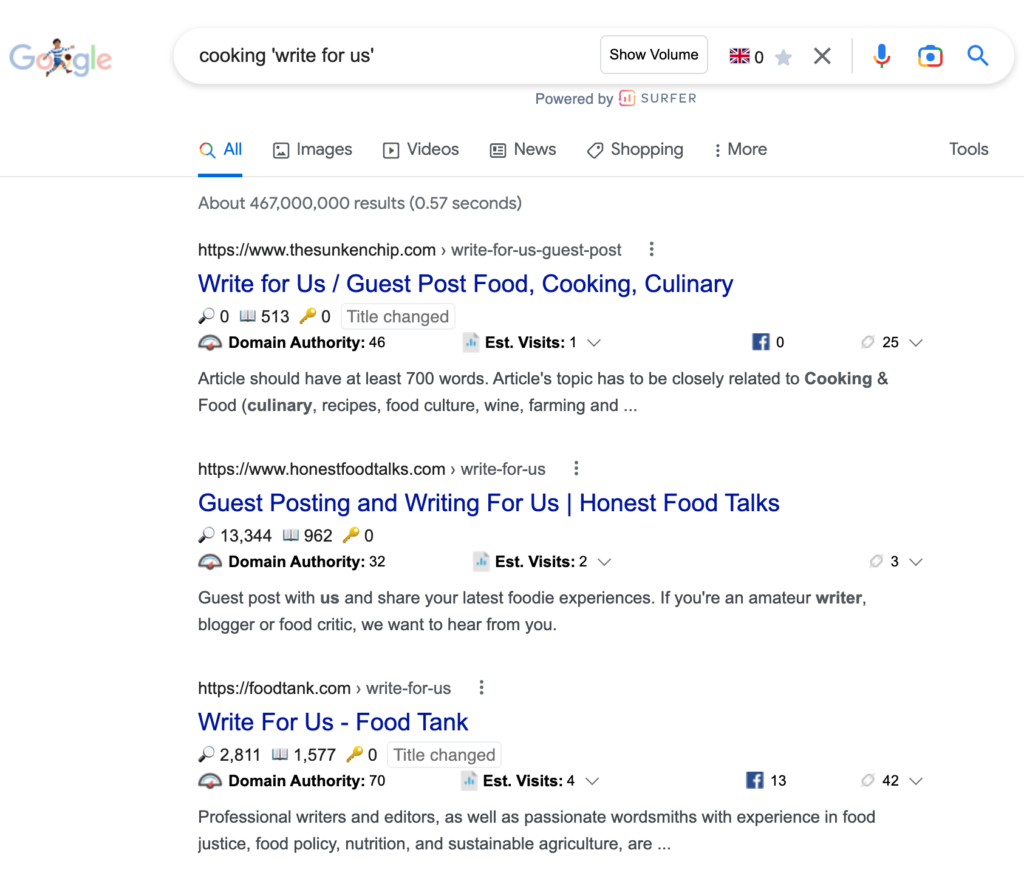To get the most out of your blog, you need to put in a little bit of extra effort.
When you’re just starting your UK blog creating and publishing content on a regular basis can feel like enough work.
Promotion is often seen as an afterthought or something that’s going to take up too much time. But, if you want to grow your blog and make money online, promotion is essential.
With that in mind, we’ve created a definitive list of all the methods and techniques to promote your UK blog that really moves the needle on traffic and revenue.
On-page SEO
Perhaps the easiest and quickest way to promote your blog is by starting where you have absolute control, ie your blog itself.
If you’re new to blogging you may have heard the acronym SEO, without context it doesn’t mean too much but its full description of search engine optimization highlights how it might be able to help with your promotion efforts.
Quite simply, SEO is the process of optimising your website and pages within to give them the best possible chance of appearing on search engine results pages.
On-page SEO in particular focuses on the changes you can make ‘on-page’ to your posts and pages to help search engine crawlers (predominantly Google) understand your content.
Let’s go over some simple steps you can take right now to improve the on-page SEO of your UK blog.
A simple process for great on-page SEO
While you don’t have to complete all of the optimisations below doing so will give you the best possible chance of receiving high-quality organic traffic directly from search engines like Google, Bing, Yahoo and more.
Keyword targeting
Every post you write should have a keyword in mind (a keyword is a word or phrase that people enter into search engines to find relevant content).
If you run a travel blog a suitable keyword would be ‘what to bring on a trip to Snowdonia‘ or for a digital marketing blog like this ‘how to promote your UK blog‘.
Once you’ve established an appropriate keyword for your post you should try to add it in the following areas:
- H1
- Meta title
- Meta description
- Start of your content
- End of your content
Throughout your article, you’ll also want to add synonyms or your core keyword to indicate a better understanding of the subject matter and cover other similar keywords with the same search intent.
Want to know more about search intent? Head over to our short read on what is search intent to find out more about informational, navigational and transactional searches.
Don’t forget this process is just as effective for your old content, going over your old articles and targeting them towards specific keywords can help drive new traffic to previously stagnant articles.
Image optimisation
SEO doesn’t just stop with your copy. If your blog post has images (ideally original ones) they can compound your keyword targeting and help drive traffic from people looking for images on search engines.
To quickly benefit from image optimisation you can:
- Title your files to include keywords or synonyms when relevant
- Include ALT text that describes the image and its content
Internal linking
Last but not least internal linking creates pathways between your articles for interested readers to delve deeper and for search engine crawlers to quickly navigate your website.
Much like backlinks (which we’ll cover later) internal links and their quantity can indicate to search engines how important individual posts and pages are on your website. Ideally, your most important pages that drive the most traffic and revenue should have the most internal links pointing to them.
Carefully orchestrated internal linking allows you to control the consumption of content on your website and also indicates a deep understanding of the subject matter by providing supporting content for each page or post on your site.
PR
PR stands for public relations, it’s how you get your company in the news, it’s what gets you on the front page of a magazine, or featured on an authoritative news site.
But how do you do it?
Press releases
If you’re a small blog owner in the UK and you’re thinking of doing some PR yourself, don’t worry. You don’t have to be an expert, you just need to know where to start.
The first thing you need is a plan. Here are some steps to help you get started:
- Write down what your goals are for your PR campaign
- Know who your audience is and how they will interact with your content
- Create a list of media outlets that fit your target audience and can help spread the word about your business
- Create a list of journalists who cover those media outlets, along with their contact information
- Think about what kind of content would appeal to each outlet or journalist (for example, if you’re pitching a story about a new product launch, including photos and video)
- Create your press release
- Distribute it to your list of qualified journalists and media outlets
If this sounds like too much you can investigate PR agencies that can do all of the above for you and can normally leverage their network to ensure your press release ends up in the right inbox.
Backlinks
Backlinks are the primary factor in search engine optimization, get them right and you can quickly elevate your search engine rankings and drive traffic from other relevant websites to your UK-based blog.
What are backlinks?
They’re links from other sites that point directly to yours. They act as votes of confidence from other websites that are happy to direct their traffic away from their site to your blog.
Acquiring backlinks is a bit of an art that requires several skill sets including data analysis, competitive analysis, outreach and networking.
Essentially you need to convince other sites to link back to yours. In an ideal world, this should happen naturally when you produce helpful content but in reality, you’re going to need to put in some work if you want to acquire links with any kind of velocity.
The most natural way to build links is by collaborating with other brands and content creators. This could be writing articles for another website and getting a link in the author bio (more on this later) or appearing on a podcast and getting your website linked in the credits.
The natural ‘black hat’ way to build links is to simply buy them. While this does work for some website owners it’s important to understand that this goes against Google’s terms of service and if you’re caught buying links you can receive a penalty which will have a severe negative effect on your visibility within search engines.
Social media
Social media is a great way to interact with your audience. You can use social media to promote your blog posts, find guest bloggers, connect with other content creators and more.
Social media also allows you to reach new readers who may not be familiar with your blog yet but have a vested interest in what you have to say.
The more followers you have on these platforms the more exposure your content will receive which will help increase traffic and subscribers to your blog.
The best social media platforms are very niche specific, if you run a blog for professionals then LinkedIn will be your first port of call. Alternatively, if your niche is very visual and brimming with attractive imagery, then platforms like Instagram and Pinterest can be great ways to drive external traffic directly to your articles.
Podcasts
Podcasts are a great way to get your message out there and establish yourself as an expert in your field. They allow listeners to come away with a better understanding of who you are, what you do, and why they should care about it.
Better yet if your primary focus is organic traffic from search engines then podcasts provide access to a whole new audience that digests content in a completely different way.
Podcasts also allow you to show off your personality and help listeners get to know you better, all while giving them something that’s relevant to their lives.
You can use podcasts for promotion by including links when mentioning your blog, products or services on the show. Another great strategy is to direct your listeners to investigate subjects and topics further by visiting specific blog posts that cover the same topics as your podcast but in much greater detail.
Guest posts
Guest posts are a great way to get your name out there, build relationships with other bloggers, and increase traffic to your blog. If you’re looking for a way to make an impact on your audience, guest posting is a great place to start.
A guest post is when you write an article for a blog or website that isn’t yours with the goal of including at least one link back to your website.
Depending on where your guest posting you may only be able to include a link in your author bio but some publications will let you link to supporting content on your website directly from the inner content of your blog post (these are the best possible backlinks to acquire).
The benefit of a guest post is threefold:
- You get a backlink to your site
- You get to engage with a new audience
- You build authority within your niche as an expert on the subject
If you’re just starting out you can find easy guest post opportunities by using Google.
Simply enter a keyword associated with your niche followed by ‘write for us’. This will bring up a list of potential outreach for your next guest post.
Here’s an example I’ve used for cooking that’s quickly identified three guest posting opportunities:

Working with other content creators in your niche
Working with other content creators in your niche can be a great way to get new readers and increase awareness of your blog.
If you’re not sure where to start, look for other blogs that are similar to yours and reach out through social media or email.
- Find people who have a large audience: If someone has an online presence, it’s likely they already have some sort of following or audience. Reach out and see if they’d be interested in collaborating on the creation of new content together.
- Find people who are in the same niche as you: You may not want to promote another site from your own country but would still like to collaborate with someone else within the same field. Smaller niches can often be more helpful when trying to find good partnerships because there aren’t as many players involved yet.
- Don’t be afraid to work with ‘competitors’ (or anyone): Sometimes working with those who compete against us can actually lead to better results than we would have expected.
- Check your emails. In many cases, you may find people have already reached out from other sites.
It’s important to lose the ‘us and them’ mindset and focus on your own growth, this can lead to all sorts of collaborative opportunities.
Conclusion
Promoting a blog is a lot of work, but if you have the drive and passion to do it, it’s worth it. If you follow these steps diligently, you’ll be able to see your readership grow by leaps and bounds.
You don’t have to employ all of the methods within this post but just by doing any one, you’ll give yourself and your UK blog the opportunity to reach new audiences and increase your readership.
We firmly believe a balanced approach to both SEO and outreach provides the best results and keeps your website safe from algorithm updates that target natural link-building practices or over optimistaion on your website.
If you’ve found this post helpful then don’t miss our other fascinating reads below packed full of helpful information to help p you promote your UK blog and increase your traffic and revenue.






